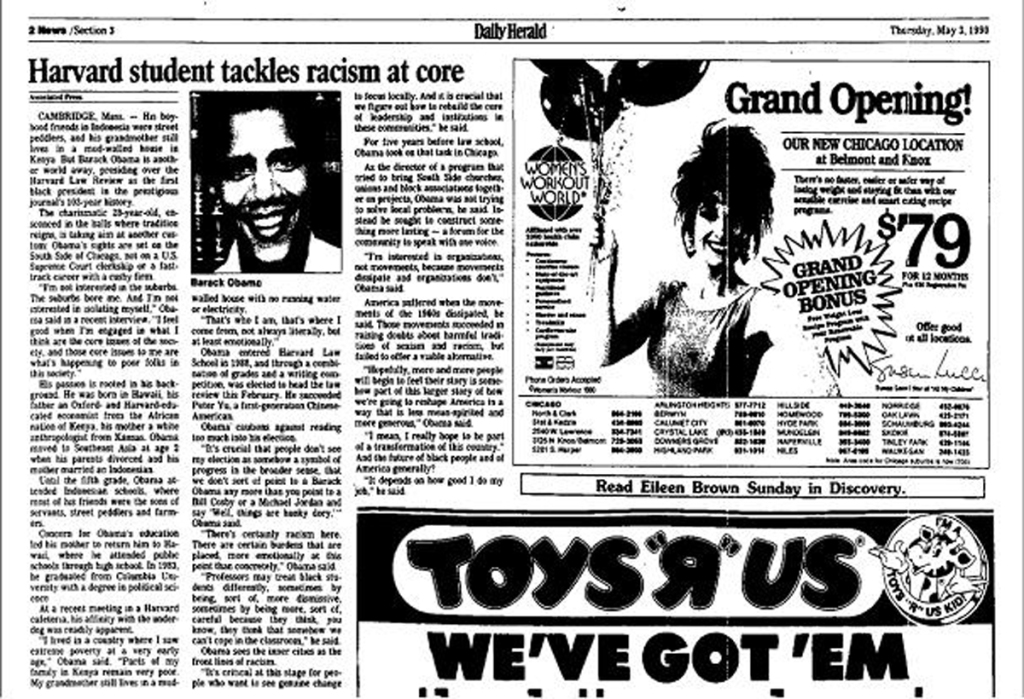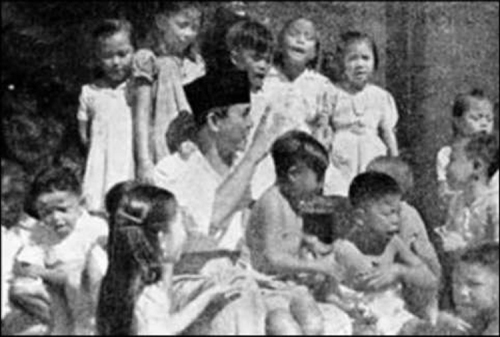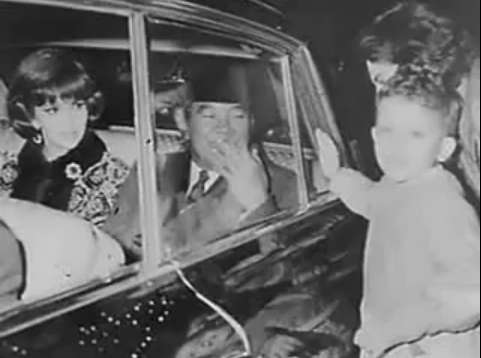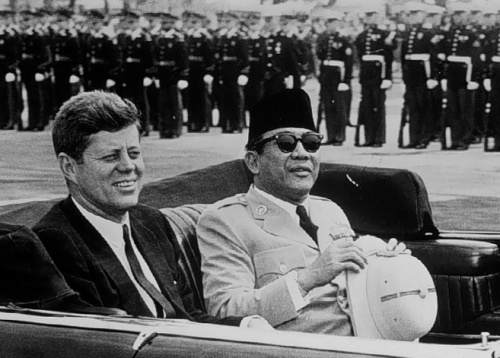REPRINTED WITH PERMISSION
December 18, 2011
“Obama History” Mystery Buffs: Sniff Here
by Martha Trowbridge
This work is protected by United States Copyright Law. PLEASE REFER TO THE REPRINT/QUOTATION POLICY LINK ABOVE
Three little Truth-ful words.
Today, at Terrible Truth, they return, full force, to haunt him.
Which is astonishing – for they were tiny little words. No doubt uttered in a moment of carelessness. A minor slip-up in the otherwise ‘perfect’ presentation of the personal history he was presenting to America.
How big a deal could they turn out to be?
Besides, “The Obama Narrative” was in test mode. Let’s give the guy a break – in spring 1990, he couldn’t help but feel exuberant. How well his political plans were progressing! He’d just been named Harvard Law Review Editor. His name, his face, his ‘history-making’ were garnering national attention.
All this, within less than two years!
How cool was that?!
Though he’d had considerable coaching by mentors, in May 1990, “Obama” hadn’t had much public practice.
And so, that exciting spring day, when his actual personal history was beginning to morph into “The Obama Narrative”, quite unwittingly, “Obama” talked Truth.
In an AP interview entitled Harvard Student Tackles Racism At Core, published 3 May 1990, he stated three words he surely has regretted:
“At age 2.”
Oh, how the tiniest details offer a gaping view into Truth.
For, the context of these three Truth-ful words is:
“Obama moved to Southeast Asia at age 2″.
America, the reason these three little words bear so much power may surprise you.
It’s not so much about when he went to Indonesia.
Their power lies in revealing where in Indonesia young Bâri′ went to live.
And who did not live with him.
“Barack Obama’s” Indonesian Odyssey did not originate with “Stanley Ann Dunham” taking him, hand-in-hand, at age six, to live with her and her new husband in a modest home in Jakarta – as “The Obama Narrative” wants you to believe.
All things considered, from what I can determine, at approximately age two, circa 1961, Bâri′ M. Shabazz apparently was sent to live at The Presidential Palace of Indonesian President Sukarno.
[You see why The Obama Campaign went to such great lengths to "establish" that he and "Stanley Ann" were in Seattle?]
President Sukarno – a Malcolm X hero, and long-time good friend.
President Sukarno: Revolutionary Extraordinaire. Sukarno, Man Against Oppression. Sukarno, who bravely, brilliantly led the Indonesian overthrow of the ‘oppressive colonial’ Dutch Government.
President Sukarno: Indonesia’s first President.
Sukarno was amongst the earliest of revolutionary world leaders to whom Malcolm latched on. A man whom Malcolm held in great esteem from the time they met, until Malcolm’s death – and who, in return, held Malcolm in great esteem.
A fair, reasonable question.
Pause a moment, and step inside the head of Malcolm X. You’ll straightaway find the answer.
Malcolm X: Always, Always, A Man With A Plan.
His conscious reasoning:
- Bâri′, his pride-and-joy son, is blessed with a sacred name, signifying his destiny http://terribletruth.wordpress.com/2011/11/02/bari′-barry-barack/
- America is a racist, hateful country, an unfit place to raise a black boy
- His ‘sole male heir’ should have the best in life
- Sukarno will mentor the boy in the ways of political leadership
To Malcolm, what would be better, than to have his heir raised, schooled and groomed by a widely acknowledged, well-to-do, revolutionary, socialist President? In a non-racist, Muslim country, to boot?!
Sadly, Malcolm likely possessed unacknowledged motivation as well: as he gained his toddler mobility, young Bâri′ would become more and more visible. He’d be playing outdoors. Enrolling in school. Getting his voice. Becoming his own person. He’d even be asking his mother questions about his father.
Shipping him off to Sukarno would place the boy safely out of sight – protecting Malcolm’s reputation as a married Muslim Minister.
A Black Muslim Minister who waged public war against whites.
Besides. It was all for the boy’s “own good”. What kind of life would Bâri′ have, growing up in East Elmhurst without a live-in father? With a teenage mother with meager resources? Imagine who he could grow to be, raised by a man like Sukarno!
As Indonesia’s first President, Sukarno [1901 - 1970] held powerful international political connections – many of whom Malcolm idolized, publicly praised, visited, and with whom he fraternized. http://www.youtube.com/watch?v=vBiJDMzzWaU&feature=related
What great opportunity Sukarno offered little boy Bâri′!
And now, America, I ask you to imagine this boy, set in a foreign country where most did not speak his language. Imagine him, barely verbal, left there amongst strangers. No more mother. No more dazzling Malcolm.
No more East Elmhurst, no more bedroom, no more tricycle.
No more America.
Bâri′, left there, oodles of thousands of miles away – “for his own good”.
From what I have gathered, I sense it was Malcolm’s idea.
As we all know, he could be very persuasive.
I also sense that, though she was young and single motherhood could not have been easy, Jo Ann was not in total concord with the plan.
But loving Malcolm, trusting his judgment, and stirred by his vision for young Bâri′, she agreed to the surrender of her toddler.
Perhaps in retrospect, Jo Ann Newman regretted the decision.
She may regret it still.
“My Lovely President Sukarno” offers glimpses into his life at home, in Indonesia http://www.youtube.com/watch?v=YN-zPe3-KN8&feature=related
Now for a surprise.
Wouldn’t it be fascinating, if, in the video still below, that’s young Bâri′ with mama Jo Ann Newman? With President Sukarno, from his limo, his eyes full of love and pride, blowing kisses at Malcolm’s and Jo Ann’s boy?
The boy who clearly had been taught two things: to wave, and to turn his face toward the camera.
Bâri′’s stay at Sukarno’s Presidential Palace didn’t last forever. In fact, his Indonesian stay may have lasted only four years – just as “The Obama Narrative” wants us to believe.
On 30 September 1965, Sukarno’s Presidential Guard soldiers executed six ‘trouble-making’ senior army generals, inciting a series of events which eventually led to his overthrow. Life became uncertain for Sukarno.
And so, life for young Bâri′ became uncertain too. [Keep in mind that his father, Malcolm X, had been assassinated just seven months prior.]
Within hours, Army Major General Suharto took command of a substantial part of Sukarno’s power base. Sukarno’s power continued to wane. A year and a half later, on 12 March 1967, Sukarno was stripped of whatever remained of his power by Indonesia’s provisional Parliament, and placed under house arrest. Suharto became President.
But back to Bâri′.
To October 1965. Sukarno begins his slip from power. Bâri′ M. Shabazz turns six.
Hmmm.
Could this be why “The Obama Narrative” has “Obama’s” mother arriving in Indonesia, when “Barry” is that age?
Coincidence? I don’t think so.
For those of you who’ve spent endless hours searching for “Obama’s” early history, including his school records, now you know why your searches have come up empty. It wasn’t your lack of skill.
They simply don’t exist.
President Sukarno would undoubtedly educate his children by carefully selected tutors.
Tutors who would school Bâri′ in diction. Elocution.
In international literature and culture.
In how to speak ‘The King’s English”.
“Obama” Trivia Question: When his grade school teacher asked “Of which country” did he want to be President – in response to his essay declaration – how did “Barry” respond?
Answer: “Barry” wasn’t yet sure.
Still unconvinced of Sukarno’s influence upon young Bâri′?
Then, for the moment, set aside the fact that Sukarno’s political philosophy merged marxism, nationalism and Islam.
I’ll show you his influence – in just two foreign words.
Two foreign words you may not be able to pronounce, but whose meaning you surely will recognize.
The inarguable imprint of Sukarno upon his precious young charge lies in “gotong royong”.
“Gotong royong is cooperation among many people to attain a shared goal.“ http://en.wikipedia.org/wiki/Gotong_royong
As President, Sukarno had great faith in the philosophy of gotong royong.
Gotong royong – many people, shared goal. Now where in America have we heard that idea?
Oh. That’s right.
In “Barack Obama’s” resounding, celebrated 2008 Presidential Campaign Slogan – “Yes We Can” – a 21st century, simplified, pop version of gotong royong!
Here’s more:
Sukarno’s governing style was “Guided Democracy”.
“Claiming Western-style Democracy was unsuitable for Indonesia, he called for a system of guided democracy. The Indonesian way of deciding important questions, he argued, was by way of prolonged deliberation designed to achieve a consensus. This was the way problems were solved at the village level, and Sukarno argued it should be the model for the entire nation. He proposed a government based not only on political parties but on “functional groups” composed of the nation’s basic elements, which would together form a National Council, through which a national consensus could express itself under presidential guidance.”
Hmmmm. Guided democracy…Prolonged deliberation…Functional groups.
“A National Council, through which a national consensus could express itself under presidential guidance.”
Now, why does this governing style sound so familiar?
You got it. It perfectly captures The “Obama” Administration.
The “Obama” Rule-By-Czar-ship.
In short, The “Obama” Way Of Governing.
And how about this?
Sukarno worked tirelessly to nationalize companies in Indonesia.
“By December 1957, Sukarno began to take concrete steps to enforce his authority over the country. On that month, he nationalised 246 Dutch companies which have been dominating Indonesian economy (most notably the NHM, Royal Dutch Shell subsidiary Bataafsche Petroleum Maatschappij, Escomptobank, Internatio, Geo Wehry & Co, Jacobson & Berg, etc)”
Oh, dear. This, too, Sukarno’s imprint on Bâri′?
If you still think I’m talking coincidence, take a good long look at this:
Sukarno cited the need for a CIVILIAN ARMY.
“He also stated his support for the establishment of “fifth force” of armed peasants and labor.”
Who amongst us has not heard “Obama’s” call for an armed Civilian Army here in America?
Before we step away from this tangle of psyches, one other striking similarity.
“While Sukarno devoted his energy for domestic and international politics, the economy of Indonesia was neglected and deteriorated rapidly. The government printed money to finance its military expenditures, resulting in hyperinflation exceeding 600% per annum in 1964-1965.”
[Quotes about Sukarno are sourced at http://en.wikipedia.org/wiki/Sukarno]
Reasonable objections to my thesis, anyone?
Oh dear. How far afield we’ve traveled from our topic: Growing Up In A Presidential Palace.
Imagine: Power with a capital ‘p’. Fineries! Lavish attentions!
Respect.
Status. [Malcolm would have been in heaven!]
To all this, who would say no?
I bet that young Bâri′ wished that he could have declined.
On that fateful day, circa 1961, was toddler Bâri′ escorted to Indonesia by his father, Malcolm? Did Jo Ann take the trip?
Or, was he whisked away by some unknown head of state, or that dignitary’s staff person?
I think not.
I think young Bâri′ went to Indonesia with President Sukarno himself. Perhaps late in April 1961, at age one and one-half, when Sukarno visted President John F. Kennedy in Washington D.C.:
http://www.jfklfoundation.org/Asset-Viewer/Archives/JFKWHP-AR6536-A.aspx
http://www.jfklfoundation.org/Asset-Viewer/Archives/JFKPOF-119-003.aspx
Audio file of President Kennedy’s Welcoming Remarks To President Sukarno http://www.jfklfoundation.org/Asset-Viewer/Archives/JFKWHA-024-002.aspx
Or perhaps Bâri′ was taken to Indonesia in early October 1961, at nearly age two, when Sukarno was in New York City at the United Nations General Assembly.
Presidential pomp and circumstance aside, in this man’s saga, does it much matter exactly when he was transplated to The Indonesian Presidential Palace?
What matters is its impact: his profound sense of abandonment. His overwhelming pain – today, still unresolved – from the decision made by his parents “for his own good”.
How it must have hurt like mad, when little Bâri′ arrived at that Palace. Eyeing the gaggles of Sukarno children, who looked and talked differently. Scanning adult stranger after adult stranger. Acclimating to an odd, wet, hot climate – and odder clothing.
To the unfamiliar walls – and bedding – of his sleeping quarters.
To the foreign food and foreign rituals.
Acclimating to the nurses and nannies and surrogate mother-figures – most of whom who likely spoke no English. Who could not explain for him what he was going through. Who could not console him.
His loneliness, though surrounded by crowds. His fear.
His pained attempts to bond with his father-substitute, the larger-than-life Sukarno, whose work kept him mostly away from The Palace.
The staggering absence of Jo Ann and Malcolm.
Toddler Bâri′, plagued with primitive anxieties, day after endless day, night after sleepless night, knowing – without comprehending why – that his parents gave him away.
One last point before we conclude.
Re: the baby photo referenced in Terrible Truth’s When The Bough Breaks, here’s the most likely story-behind-the-story:
By February 1962, Jo Ann’s baby was gone from New York.
Quite naturally, Jo Ann would be missing him. She’d be concerned for his well-being. She’d even be second-guessing her decision to ship him off to the other side of the world, and leave him in the care of strangers.
Consider that with that photo, Malcolm used the caption “THE YOUNG LISTENED”.
It is my assessment that placement of Bâri′ as an infant in this edition was Malcolm’s way of consoling Jo Ann at the loss of her child. His means of reminding Jo Ann that her child was in a far better place, being provided for in a far loftier way than she, a poor girl from the Bronx, or he, a married Muslim Minister, ever could offer the boy.
In an unexpected way, perhaps his father was correct, from this perspective: today, you don’t see “Barack Obama” happier than when he’s with the Indonesian President.
Though I suspect that if you could see inside his soul, you’d find geysers of hot sharp pain slapping up against his smile.
































 An election for President and Commander in Chief of the Military must strive to be above reproach. Our public institutions must give the public confidence that a presidential candidate has complied with the election process that is prescribed by our Constitution and laws. It is only after a presidential candidate satisfies the rules of such a process that he/she can expect members of the public, regardless of their party affiliations, to give him/her the respect that the Office of President so much deserves.
An election for President and Commander in Chief of the Military must strive to be above reproach. Our public institutions must give the public confidence that a presidential candidate has complied with the election process that is prescribed by our Constitution and laws. It is only after a presidential candidate satisfies the rules of such a process that he/she can expect members of the public, regardless of their party affiliations, to give him/her the respect that the Office of President so much deserves.

means he loses his son Jo Ann that her son was in a much better place
ReplyDeleteawesome
ReplyDelete